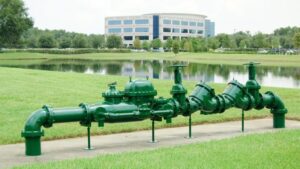
Effective stormwater management is crucial for sustainable urban development, and plumbing pipelines play a pivotal role in this process. In this comprehensive blog, we delve into the intricate realm of stormwater management through efficient plumbing pipelines. Discover cutting-edge technologies, eco-friendly practices, and innovative design considerations that contribute to the seamless flow and proper disposal of stormwater.
As we explore the intersection of plumbing and environmental sustainability, you’ll gain insights into how well-designed pipelines can mitigate flooding, erosion, and pollution, ensuring a resilient and eco-conscious infrastructure.
Stormwater management through effective plumbing pipelines
Sustainable Stormwater Management

Efficient stormwater management is a critical component of sustainable urban planning, and the role of plumbing pipelines in this process cannot be overstated. These pipelines form the backbone of a well-designed stormwater management system, guiding the flow of rainwater away from urban areas to prevent flooding. Sustainable stormwater management aims to minimize environmental impact, reduce pollution, and safeguard water resources. By implementing effective plumbing pipelines, cities can enhance their resilience to climate-related challenges, ensuring a balance between urban development and ecological conservation.
Innovative Technologies for Stormwater Control
The evolution of technology has brought forth innovative solutions for stormwater control through plumbing pipelines. Smart sensor technologies now enable real-time monitoring of water flow, helping to predict and prevent potential issues. Additionally, advanced materials such as permeable pavements allow stormwater to infiltrate the ground, reducing runoff and improving water quality. These technologies contribute to the efficiency and sustainability of stormwater management, showcasing the adaptability of plumbing systems to modern challenges.
Eco-Friendly Plumbing Practices
Embracing eco-friendly plumbing practices is integral to holistic stormwater management. Green infrastructure, such as green roofs and rain gardens, combined with permeable surfaces, can significantly reduce the volume and velocity of stormwater runoff. These sustainable practices enhance water absorption, mitigate flooding, and support overall environmental health. Integrating eco-friendly elements with plumbing pipelines ensures a harmonious coexistence between urban development and nature, fostering resilient and environmentally conscious communities.
Read Also: 10 Eco-friendly Plumbing Options For Your Home
Design Considerations for Resilient Pipelines

The design of plumbing pipelines plays a crucial role in creating resilient stormwater management systems. Proper slope and sizing, along with strategic placement of drainage structures, facilitate efficient water flow and prevent blockages. Incorporating backflow prevention devices safeguards against contamination, ensuring the integrity of both the plumbing system and the surrounding environment. Thoughtful design considerations enhance the longevity and functionality of plumbing pipelines, contributing to a sustainable and well-maintained stormwater infrastructure.
Community Awareness and Education
Community awareness and education are essential components of effective stormwater management through plumbing pipelines. Educating residents about responsible water usage, the impact of stormwater runoff on local ecosystems, and the significance of well-maintained plumbing systems can lead to proactive community involvement. Engaging communities in stormwater management initiatives fosters a sense of responsibility, encouraging sustainable practices that benefit both the local environment and the broader community.
In conclusion, stormwater management through effective plumbing pipelines is a multifaceted endeavor that encompasses technological innovation, eco-friendly practices, and community engagement. By prioritizing sustainability in plumbing infrastructure, cities can mitigate the adverse effects of stormwater, create resilient urban spaces, and contribute to a healthier environment for current and future generations.
Conclusion
In conclusion, understanding the importance of stormwater management through effective plumbing pipelines is vital for creating resilient urban environments. By embracing modern technologies, sustainable practices, and proactive maintenance strategies, communities can build robust plumbing infrastructures that efficiently handle stormwater. This not only prevents environmental degradation but also promotes the long-term health and functionality of the overall plumbing system. As we continue to prioritize sustainable solutions, the impact on our cities and ecosystems will be transformative, fostering a harmonious coexistence between urban development and environmental conservation.
FAQs
How do plumbing pipelines contribute to stormwater management?
Plumbing pipelines guide the flow of stormwater, preventing flooding and ensuring proper drainage, thereby reducing the risk of water-related issues.
Are there eco-friendly practices in stormwater management through plumbing?
Yes, eco-friendly stormwater management involves permeable surfaces, rain gardens, and green infrastructure, all integrated with efficient plumbing pipelines for sustainable water disposal.



